Effects of Age on Rate of False Recognition: PSY 107 Assignment
VerifiedAdded on 2020/02/24
|9
|1242
|120
Report
AI Summary
This psychology report investigates the effects of age on false recognition using a between-participants design with younger and older adults. Participants were presented with lists of related words and asked to recall as many words as possible. The study employed the DRM paradigm, where a critical lure word was not presented but often falsely recalled. The results, analyzed using an independent samples t-test, showed that older adults had a significantly higher mean score of falsely recognized words compared to younger adults, supporting the experimental hypothesis. This aligns with previous research indicating that older adults are more susceptible to false memories. The report discusses the implications of these findings, highlighting age-related differences in memory and cognitive processes, and referencing relevant studies in the field of psychology.
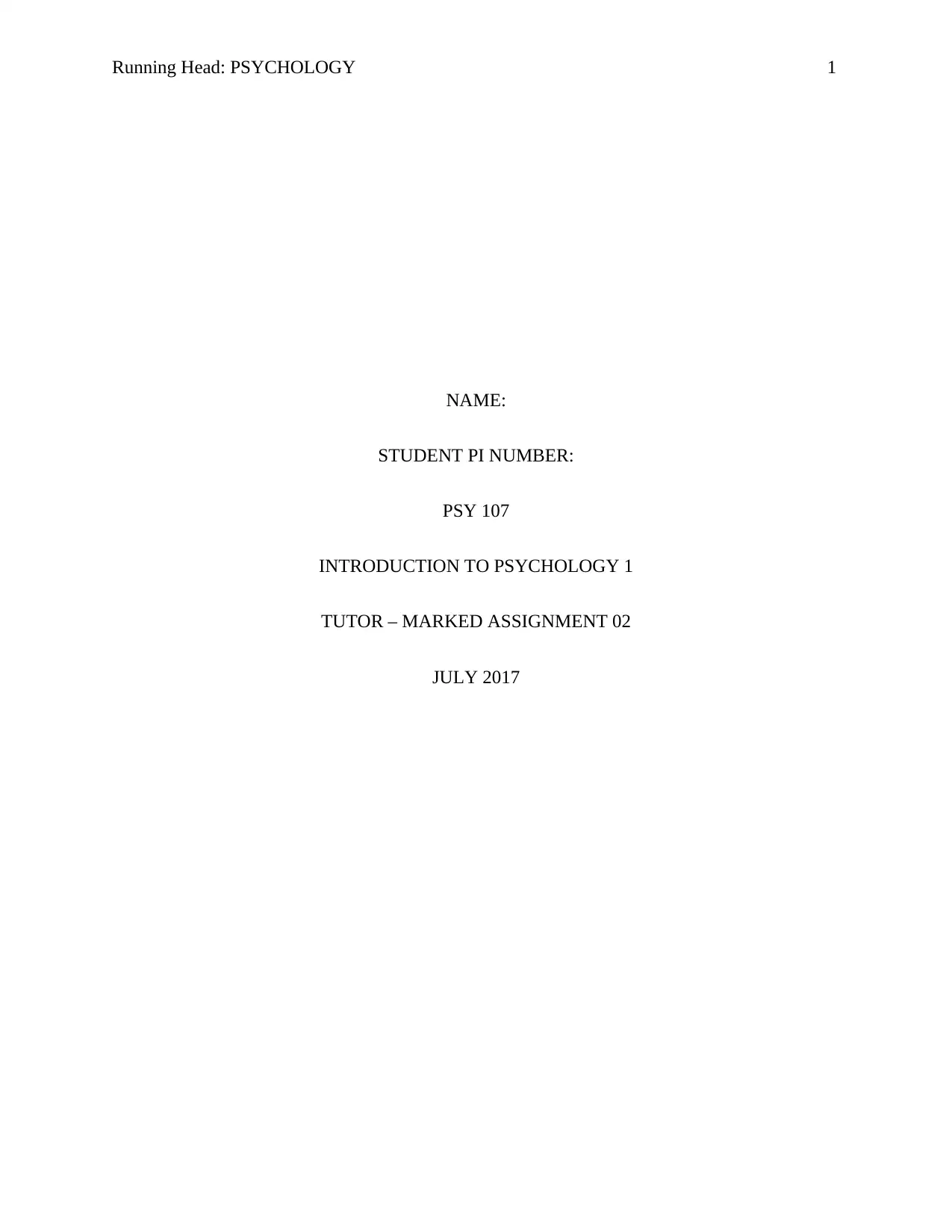
Running Head: PSYCHOLOGY 1
NAME:
STUDENT PI NUMBER:
PSY 107
INTRODUCTION TO PSYCHOLOGY 1
TUTOR – MARKED ASSIGNMENT 02
JULY 2017
NAME:
STUDENT PI NUMBER:
PSY 107
INTRODUCTION TO PSYCHOLOGY 1
TUTOR – MARKED ASSIGNMENT 02
JULY 2017
Paraphrase This Document
Need a fresh take? Get an instant paraphrase of this document with our AI Paraphraser
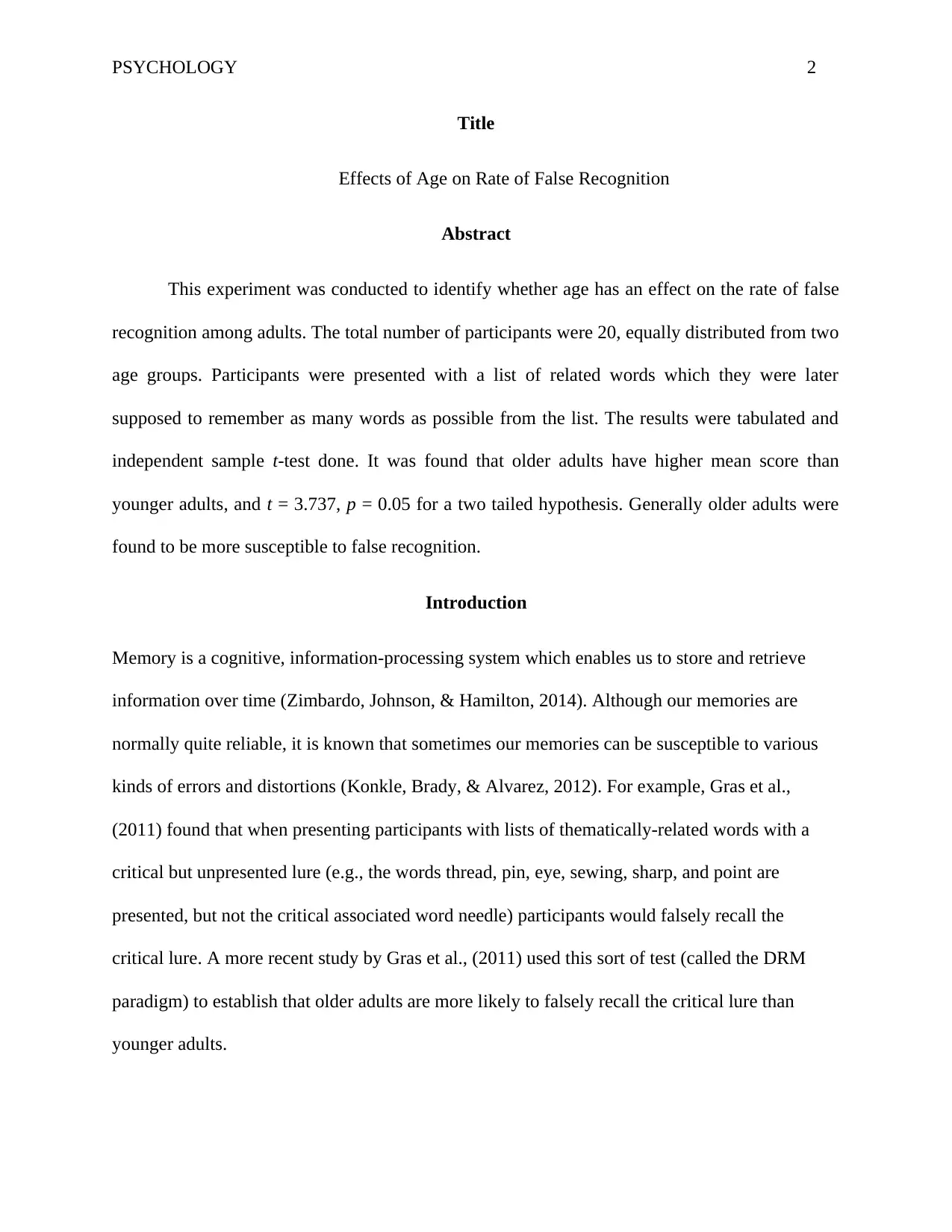
PSYCHOLOGY 2
Title
Effects of Age on Rate of False Recognition
Abstract
This experiment was conducted to identify whether age has an effect on the rate of false
recognition among adults. The total number of participants were 20, equally distributed from two
age groups. Participants were presented with a list of related words which they were later
supposed to remember as many words as possible from the list. The results were tabulated and
independent sample t-test done. It was found that older adults have higher mean score than
younger adults, and t = 3.737, p = 0.05 for a two tailed hypothesis. Generally older adults were
found to be more susceptible to false recognition.
Introduction
Memory is a cognitive, information-processing system which enables us to store and retrieve
information over time (Zimbardo, Johnson, & Hamilton, 2014). Although our memories are
normally quite reliable, it is known that sometimes our memories can be susceptible to various
kinds of errors and distortions (Konkle, Brady, & Alvarez, 2012). For example, Gras et al.,
(2011) found that when presenting participants with lists of thematically-related words with a
critical but unpresented lure (e.g., the words thread, pin, eye, sewing, sharp, and point are
presented, but not the critical associated word needle) participants would falsely recall the
critical lure. A more recent study by Gras et al., (2011) used this sort of test (called the DRM
paradigm) to establish that older adults are more likely to falsely recall the critical lure than
younger adults.
Title
Effects of Age on Rate of False Recognition
Abstract
This experiment was conducted to identify whether age has an effect on the rate of false
recognition among adults. The total number of participants were 20, equally distributed from two
age groups. Participants were presented with a list of related words which they were later
supposed to remember as many words as possible from the list. The results were tabulated and
independent sample t-test done. It was found that older adults have higher mean score than
younger adults, and t = 3.737, p = 0.05 for a two tailed hypothesis. Generally older adults were
found to be more susceptible to false recognition.
Introduction
Memory is a cognitive, information-processing system which enables us to store and retrieve
information over time (Zimbardo, Johnson, & Hamilton, 2014). Although our memories are
normally quite reliable, it is known that sometimes our memories can be susceptible to various
kinds of errors and distortions (Konkle, Brady, & Alvarez, 2012). For example, Gras et al.,
(2011) found that when presenting participants with lists of thematically-related words with a
critical but unpresented lure (e.g., the words thread, pin, eye, sewing, sharp, and point are
presented, but not the critical associated word needle) participants would falsely recall the
critical lure. A more recent study by Gras et al., (2011) used this sort of test (called the DRM
paradigm) to establish that older adults are more likely to falsely recall the critical lure than
younger adults.
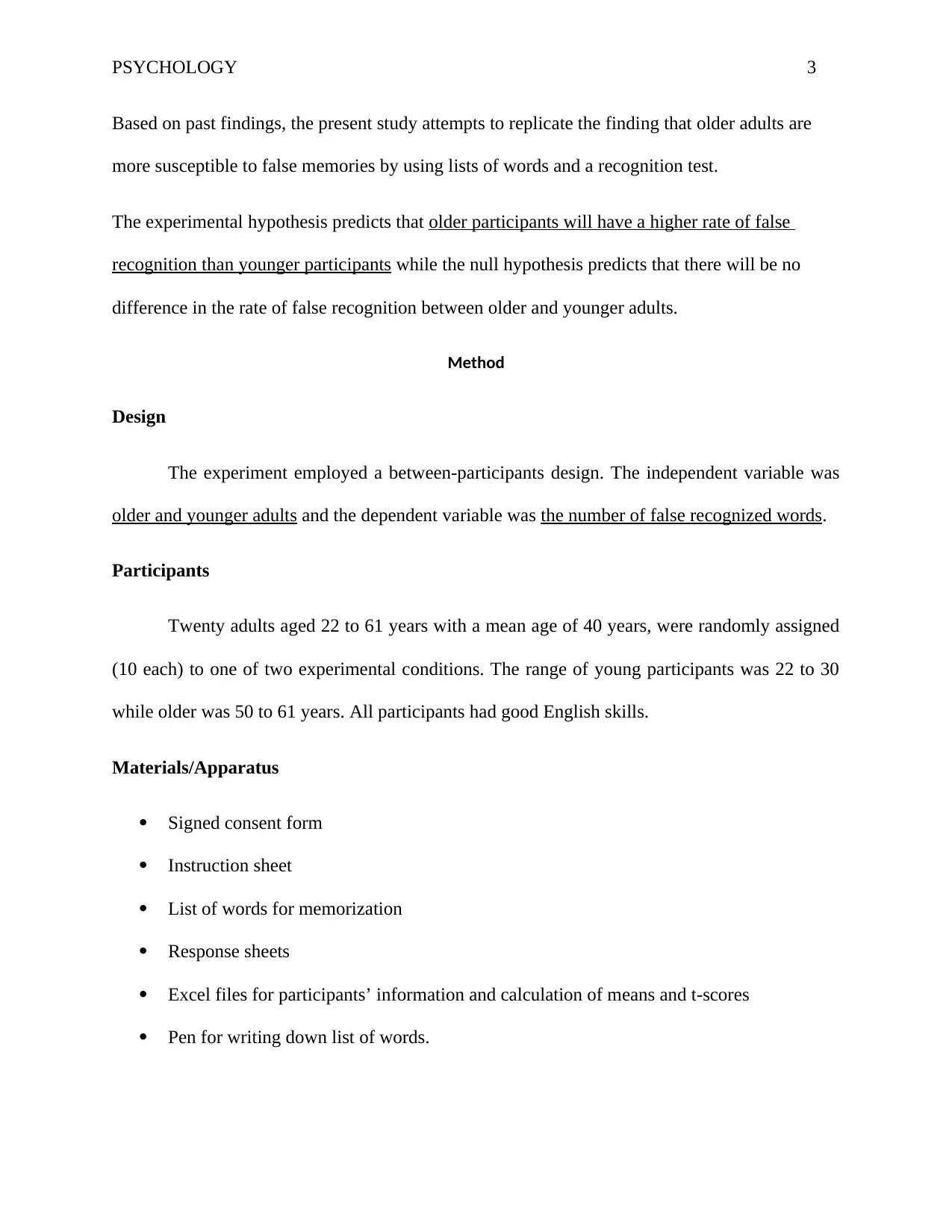
PSYCHOLOGY 3
Based on past findings, the present study attempts to replicate the finding that older adults are
more susceptible to false memories by using lists of words and a recognition test.
The experimental hypothesis predicts that older participants will have a higher rate of false
recognition than younger participants while the null hypothesis predicts that there will be no
difference in the rate of false recognition between older and younger adults.
Method
Design
The experiment employed a between-participants design. The independent variable was
older and younger adults and the dependent variable was the number of false recognized words.
Participants
Twenty adults aged 22 to 61 years with a mean age of 40 years, were randomly assigned
(10 each) to one of two experimental conditions. The range of young participants was 22 to 30
while older was 50 to 61 years. All participants had good English skills.
Materials/Apparatus
Signed consent form
Instruction sheet
List of words for memorization
Response sheets
Excel files for participants’ information and calculation of means and t-scores
Pen for writing down list of words.
Based on past findings, the present study attempts to replicate the finding that older adults are
more susceptible to false memories by using lists of words and a recognition test.
The experimental hypothesis predicts that older participants will have a higher rate of false
recognition than younger participants while the null hypothesis predicts that there will be no
difference in the rate of false recognition between older and younger adults.
Method
Design
The experiment employed a between-participants design. The independent variable was
older and younger adults and the dependent variable was the number of false recognized words.
Participants
Twenty adults aged 22 to 61 years with a mean age of 40 years, were randomly assigned
(10 each) to one of two experimental conditions. The range of young participants was 22 to 30
while older was 50 to 61 years. All participants had good English skills.
Materials/Apparatus
Signed consent form
Instruction sheet
List of words for memorization
Response sheets
Excel files for participants’ information and calculation of means and t-scores
Pen for writing down list of words.
⊘ This is a preview!⊘
Do you want full access?
Subscribe today to unlock all pages.

Trusted by 1+ million students worldwide
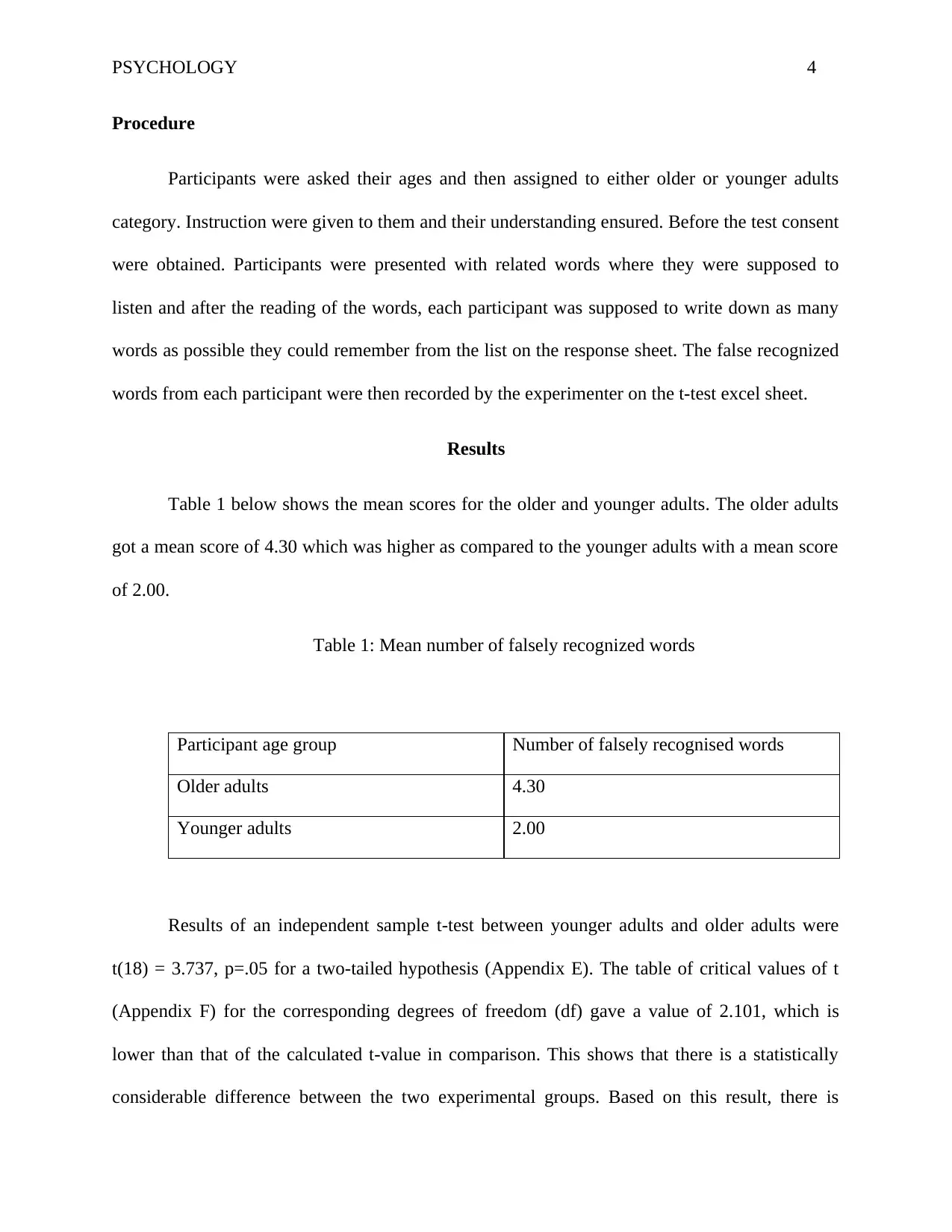
PSYCHOLOGY 4
Procedure
Participants were asked their ages and then assigned to either older or younger adults
category. Instruction were given to them and their understanding ensured. Before the test consent
were obtained. Participants were presented with related words where they were supposed to
listen and after the reading of the words, each participant was supposed to write down as many
words as possible they could remember from the list on the response sheet. The false recognized
words from each participant were then recorded by the experimenter on the t-test excel sheet.
Results
Table 1 below shows the mean scores for the older and younger adults. The older adults
got a mean score of 4.30 which was higher as compared to the younger adults with a mean score
of 2.00.
Table 1: Mean number of falsely recognized words
Participant age group Number of falsely recognised words
Older adults 4.30
Younger adults 2.00
Results of an independent sample t-test between younger adults and older adults were
t(18) = 3.737, p=.05 for a two-tailed hypothesis (Appendix E). The table of critical values of t
(Appendix F) for the corresponding degrees of freedom (df) gave a value of 2.101, which is
lower than that of the calculated t-value in comparison. This shows that there is a statistically
considerable difference between the two experimental groups. Based on this result, there is
Procedure
Participants were asked their ages and then assigned to either older or younger adults
category. Instruction were given to them and their understanding ensured. Before the test consent
were obtained. Participants were presented with related words where they were supposed to
listen and after the reading of the words, each participant was supposed to write down as many
words as possible they could remember from the list on the response sheet. The false recognized
words from each participant were then recorded by the experimenter on the t-test excel sheet.
Results
Table 1 below shows the mean scores for the older and younger adults. The older adults
got a mean score of 4.30 which was higher as compared to the younger adults with a mean score
of 2.00.
Table 1: Mean number of falsely recognized words
Participant age group Number of falsely recognised words
Older adults 4.30
Younger adults 2.00
Results of an independent sample t-test between younger adults and older adults were
t(18) = 3.737, p=.05 for a two-tailed hypothesis (Appendix E). The table of critical values of t
(Appendix F) for the corresponding degrees of freedom (df) gave a value of 2.101, which is
lower than that of the calculated t-value in comparison. This shows that there is a statistically
considerable difference between the two experimental groups. Based on this result, there is
Paraphrase This Document
Need a fresh take? Get an instant paraphrase of this document with our AI Paraphraser
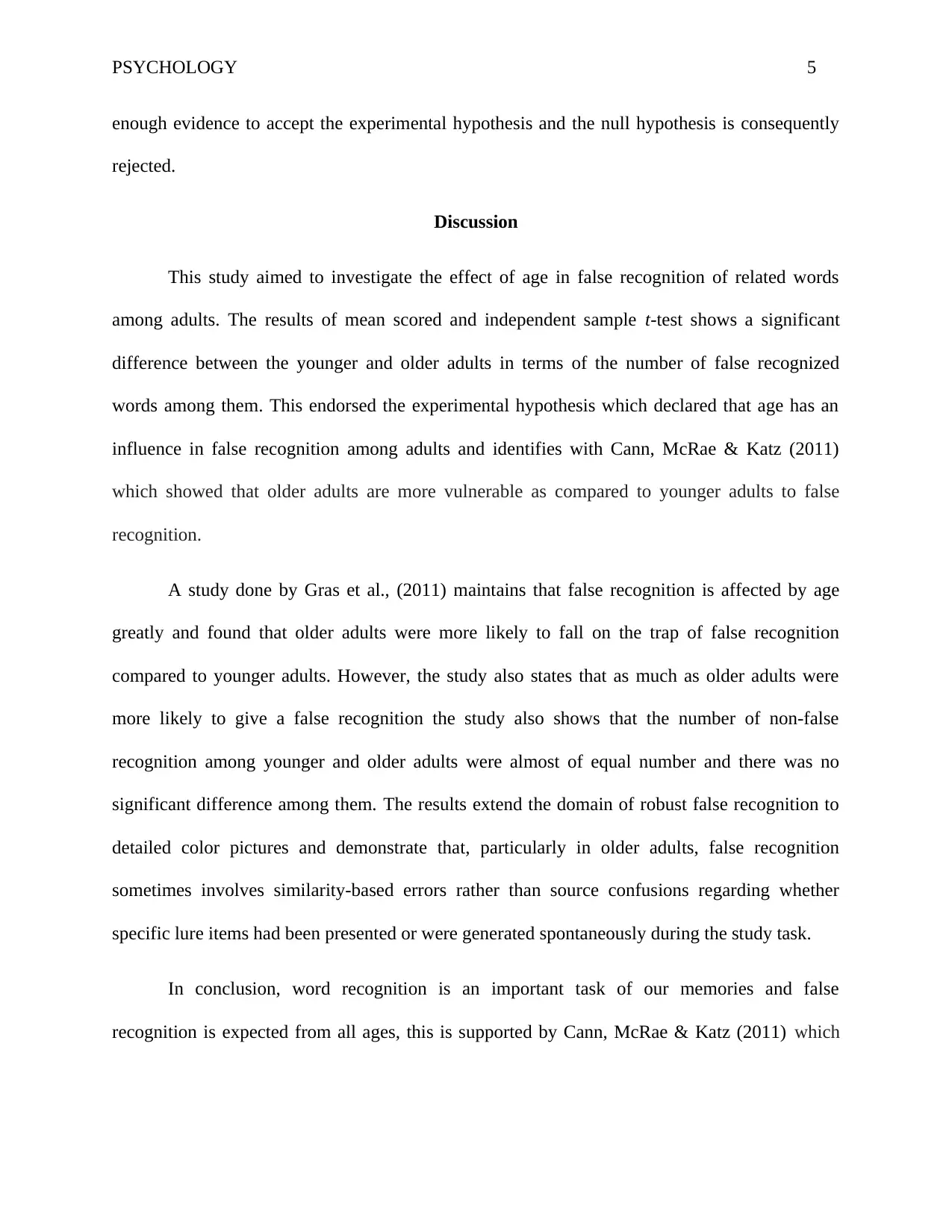
PSYCHOLOGY 5
enough evidence to accept the experimental hypothesis and the null hypothesis is consequently
rejected.
Discussion
This study aimed to investigate the effect of age in false recognition of related words
among adults. The results of mean scored and independent sample t-test shows a significant
difference between the younger and older adults in terms of the number of false recognized
words among them. This endorsed the experimental hypothesis which declared that age has an
influence in false recognition among adults and identifies with Cann, McRae & Katz (2011)
which showed that older adults are more vulnerable as compared to younger adults to false
recognition.
A study done by Gras et al., (2011) maintains that false recognition is affected by age
greatly and found that older adults were more likely to fall on the trap of false recognition
compared to younger adults. However, the study also states that as much as older adults were
more likely to give a false recognition the study also shows that the number of non-false
recognition among younger and older adults were almost of equal number and there was no
significant difference among them. The results extend the domain of robust false recognition to
detailed color pictures and demonstrate that, particularly in older adults, false recognition
sometimes involves similarity-based errors rather than source confusions regarding whether
specific lure items had been presented or were generated spontaneously during the study task.
In conclusion, word recognition is an important task of our memories and false
recognition is expected from all ages, this is supported by Cann, McRae & Katz (2011) which
enough evidence to accept the experimental hypothesis and the null hypothesis is consequently
rejected.
Discussion
This study aimed to investigate the effect of age in false recognition of related words
among adults. The results of mean scored and independent sample t-test shows a significant
difference between the younger and older adults in terms of the number of false recognized
words among them. This endorsed the experimental hypothesis which declared that age has an
influence in false recognition among adults and identifies with Cann, McRae & Katz (2011)
which showed that older adults are more vulnerable as compared to younger adults to false
recognition.
A study done by Gras et al., (2011) maintains that false recognition is affected by age
greatly and found that older adults were more likely to fall on the trap of false recognition
compared to younger adults. However, the study also states that as much as older adults were
more likely to give a false recognition the study also shows that the number of non-false
recognition among younger and older adults were almost of equal number and there was no
significant difference among them. The results extend the domain of robust false recognition to
detailed color pictures and demonstrate that, particularly in older adults, false recognition
sometimes involves similarity-based errors rather than source confusions regarding whether
specific lure items had been presented or were generated spontaneously during the study task.
In conclusion, word recognition is an important task of our memories and false
recognition is expected from all ages, this is supported by Cann, McRae & Katz (2011) which

PSYCHOLOGY 6
states that as much as older adults are prone to false recognition of words even younger adults
also fall in the trap of false recognition of words.
states that as much as older adults are prone to false recognition of words even younger adults
also fall in the trap of false recognition of words.
⊘ This is a preview!⊘
Do you want full access?
Subscribe today to unlock all pages.

Trusted by 1+ million students worldwide
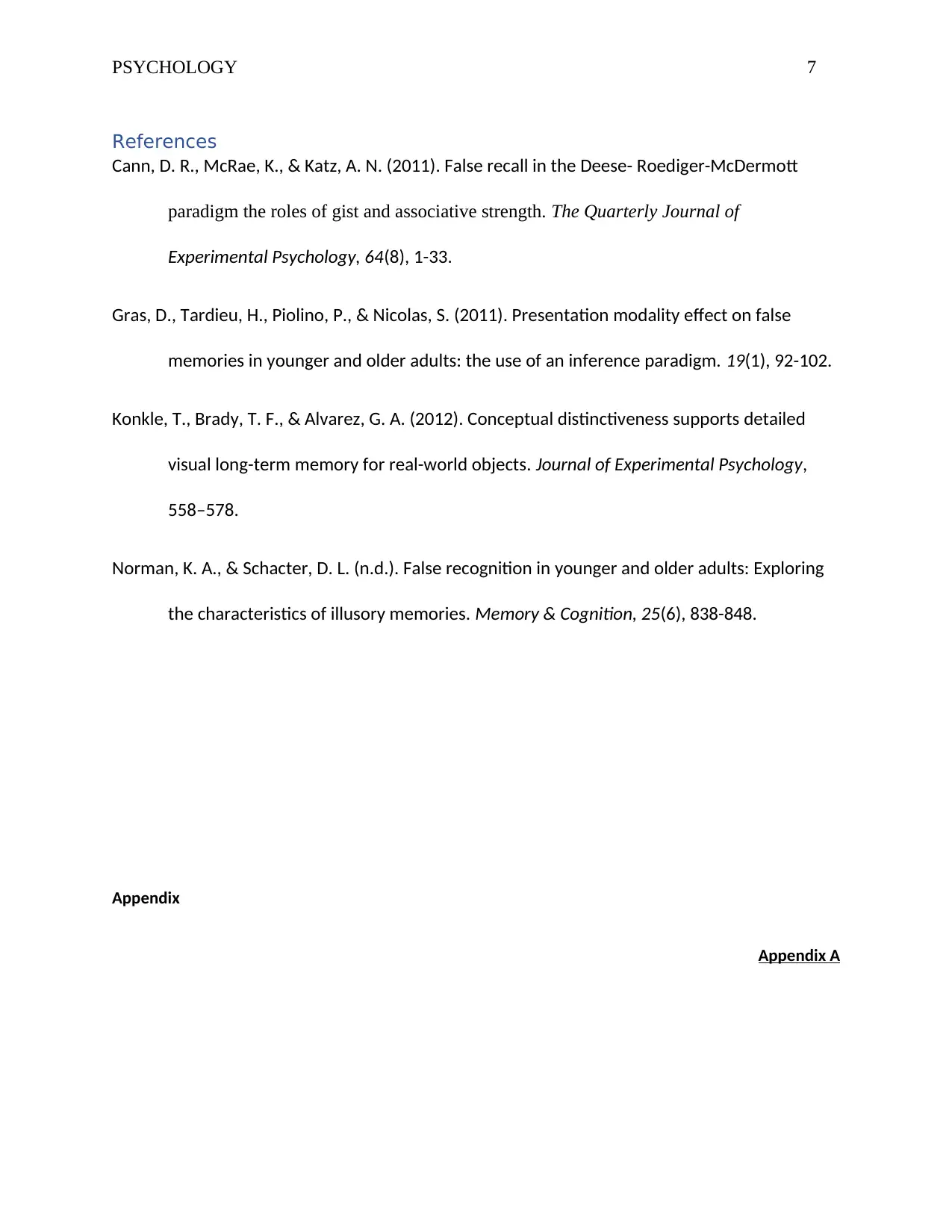
PSYCHOLOGY 7
References
Cann, D. R., McRae, K., & Katz, A. N. (2011). False recall in the Deese- Roediger-McDermott
paradigm the roles of gist and associative strength. The Quarterly Journal of
Experimental Psychology, 64(8), 1-33.
Gras, D., Tardieu, H., Piolino, P., & Nicolas, S. (2011). Presentation modality effect on false
memories in younger and older adults: the use of an inference paradigm. 19(1), 92-102.
Konkle, T., Brady, T. F., & Alvarez, G. A. (2012). Conceptual distinctiveness supports detailed
visual long-term memory for real-world objects. Journal of Experimental Psychology,
558–578.
Norman, K. A., & Schacter, D. L. (n.d.). False recognition in younger and older adults: Exploring
the characteristics of illusory memories. Memory & Cognition, 25(6), 838-848.
Appendix
Appendix A
References
Cann, D. R., McRae, K., & Katz, A. N. (2011). False recall in the Deese- Roediger-McDermott
paradigm the roles of gist and associative strength. The Quarterly Journal of
Experimental Psychology, 64(8), 1-33.
Gras, D., Tardieu, H., Piolino, P., & Nicolas, S. (2011). Presentation modality effect on false
memories in younger and older adults: the use of an inference paradigm. 19(1), 92-102.
Konkle, T., Brady, T. F., & Alvarez, G. A. (2012). Conceptual distinctiveness supports detailed
visual long-term memory for real-world objects. Journal of Experimental Psychology,
558–578.
Norman, K. A., & Schacter, D. L. (n.d.). False recognition in younger and older adults: Exploring
the characteristics of illusory memories. Memory & Cognition, 25(6), 838-848.
Appendix
Appendix A
Paraphrase This Document
Need a fresh take? Get an instant paraphrase of this document with our AI Paraphraser
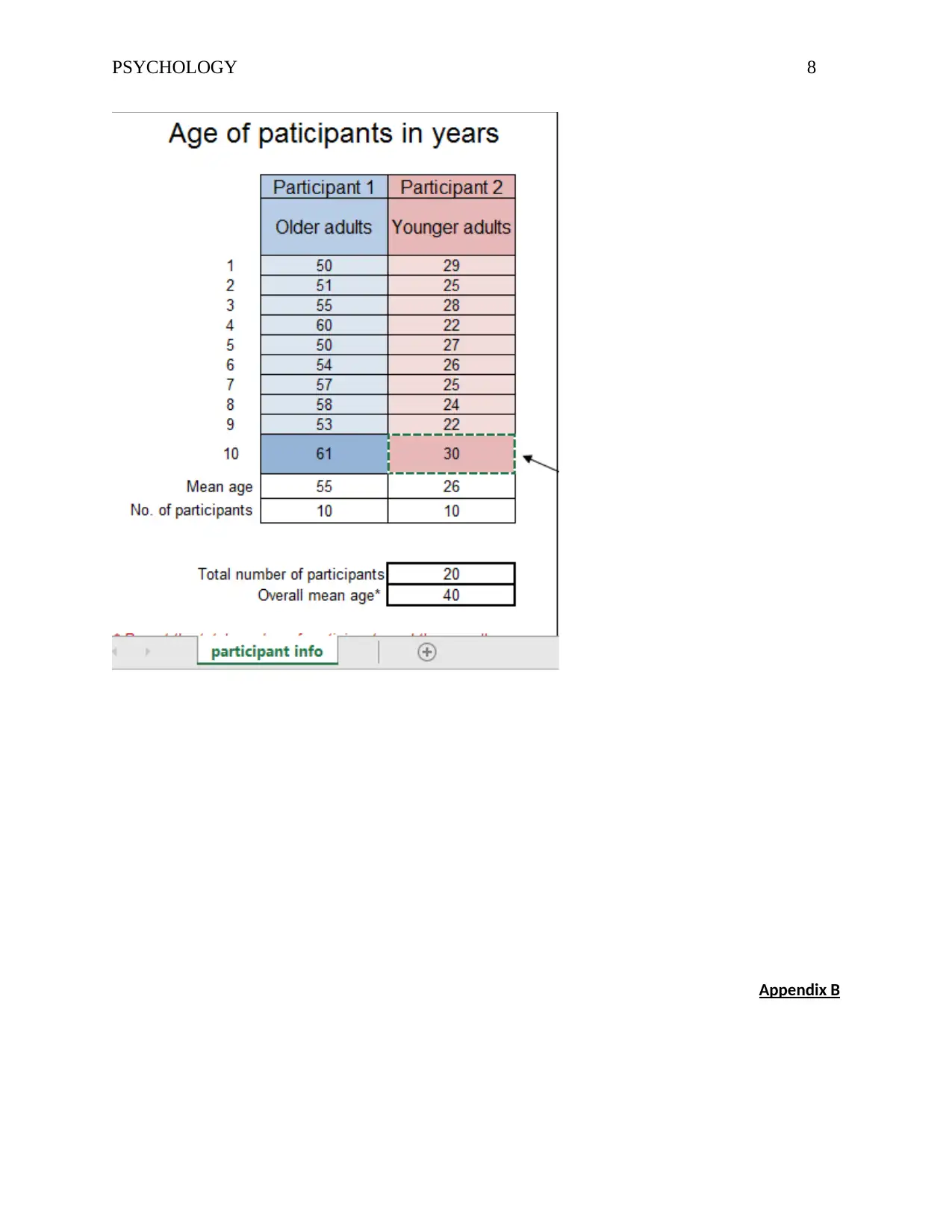
PSYCHOLOGY 8
Appendix B
Appendix B
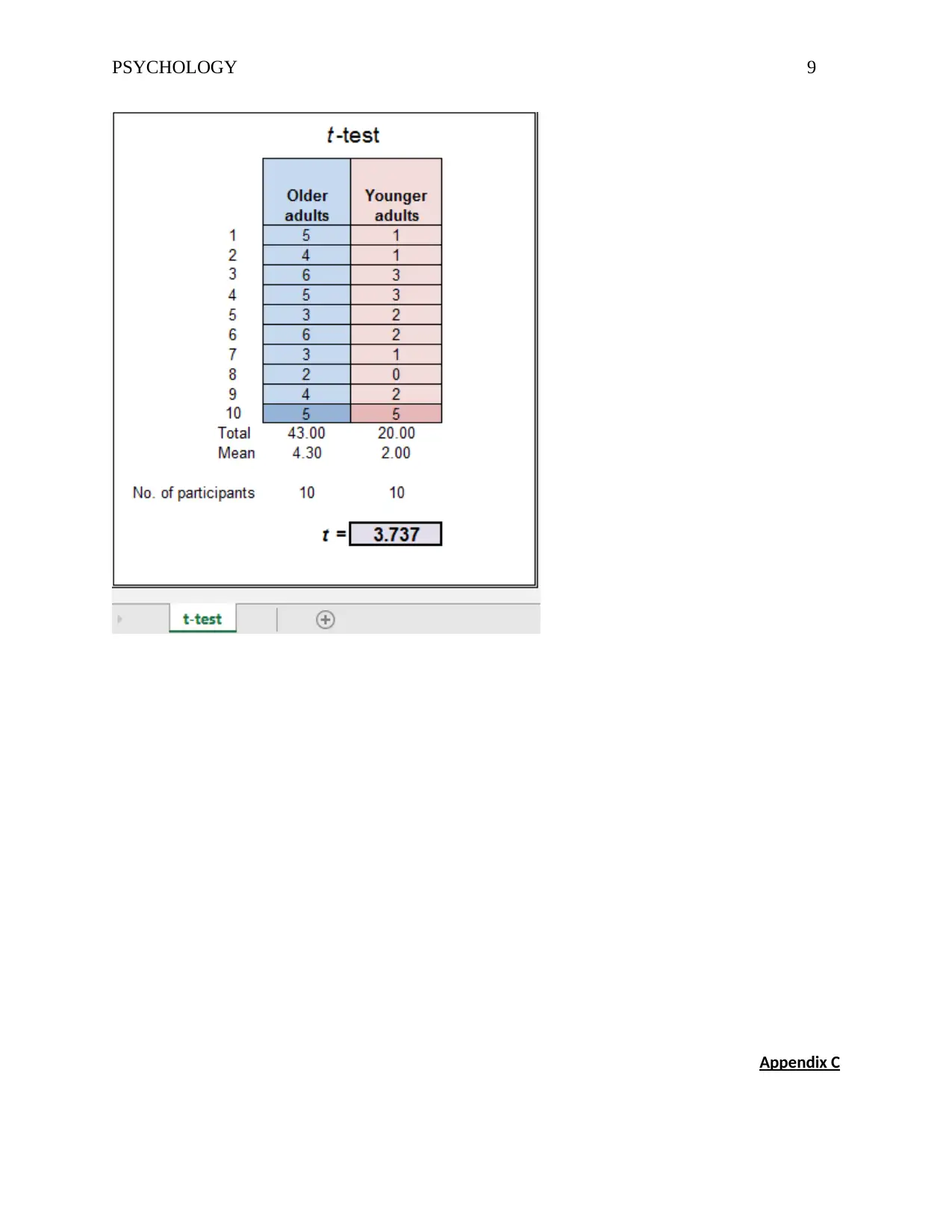
PSYCHOLOGY 9
Appendix C
Appendix C
⊘ This is a preview!⊘
Do you want full access?
Subscribe today to unlock all pages.

Trusted by 1+ million students worldwide
1 out of 9
Your All-in-One AI-Powered Toolkit for Academic Success.
+13062052269
info@desklib.com
Available 24*7 on WhatsApp / Email
![[object Object]](/_next/static/media/star-bottom.7253800d.svg)
Unlock your academic potential
Copyright © 2020–2026 A2Z Services. All Rights Reserved. Developed and managed by ZUCOL.


